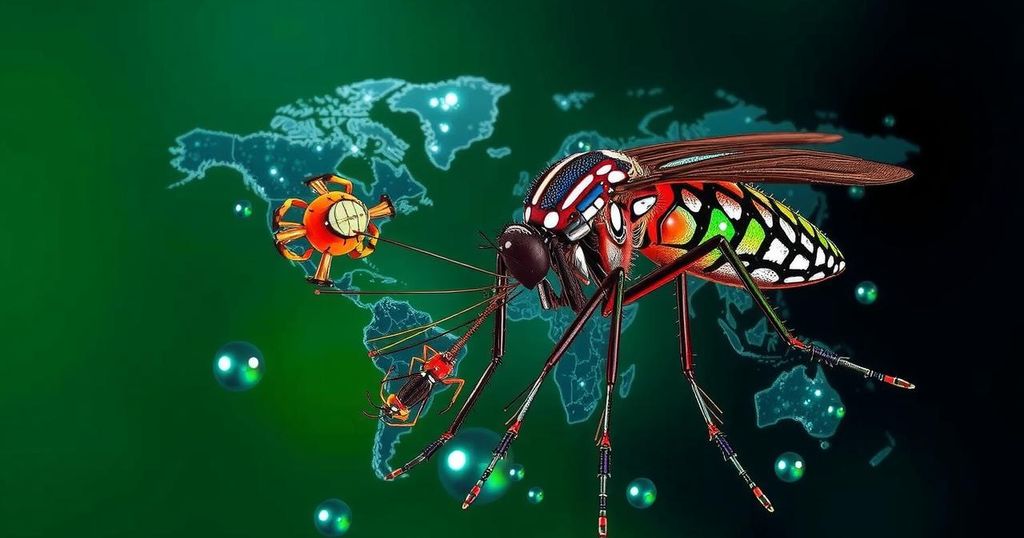Climate change
AFP, AMERICAS, ASIA, BOLIVIA, BRAZIL, CLIMATE, CLIMATE CHANGE, CUBA, ERIN MORDECAI, GLOBAL WARMING, MEXICO, MOR, MORDECAI, NATURAL DISASTERS, NORTH AMERICA, PERU, PHILIPPINES, SCIENCE, SOUTH AMERICA, STANFORD UNIVERSITY, UNITED STATES, WORLD HEALTH ORGANIZATION
Leila Ramsay
0 Comments
Climate Change Linked to Increase in Dengue Cases: New Research Findings
U.S. researchers report that climate change accounts for nearly 20% of dengue fever cases globally, emphasizing the connection between rising temperatures and the spread of the disease. Rising temperatures are projected to increase dengue cases significantly in some regions over the next 25 years. A separate study shows promise for controlling dengue through the use of Wolbachia-infected mosquitoes, which have demonstrated effectiveness in reducing transmission rates.
Researchers have found that climate change is responsible for nearly 20% of the record dengue fever cases reported globally this year. This assertion was made by a team of U.S. scientists who are exploring the connection between climate change and the spread of infectious diseases. This analysis specifically focuses on how rising temperatures facilitate the proliferation of the Aedes mosquitoes that transmit dengue, especially in regions historically outside its endemic areas. The study evaluated dengue infections across 21 countries in Asia and the Americas, noting an alarming trend: a significant increase in cases correlated with higher temperatures, particularly in the range conducive to mosquito breeding. Senior author Erin Mordecai emphasized that climate-related factors are altering the geographical spread of dengue, with regions in South America potentially seeing a twofold increase in cases over the next quarter-century. As climate change escalates, it is projected that approximately 257 million individuals currently reside in areas where the incidence of dengue could significantly rise. Notably, the World Health Organization reported more than 12.7 million dengue cases by September 2023, marking a near 100% increase over previous records. However, experts suggest that the actual figures may be closer to 100 million, due to extensive under-reporting. In conjunction with these findings, researchers introduced a potential solution to combat the growing dengue threat. Scientists have been breeding Aedes mosquitoes infected with the Wolbachia bacteria, which inhibits the transmission of dengue. The use of Wolbachia-infected mosquitoes in Niteroi, Brazil, led to a remarkable decrease in cases during the city’s worst dengue outbreak, demonstrating the bacteria’s potential to provide lasting protection for communities facing rising dengue incidences.
The article discusses the alarming impact of climate change on the rise of dengue fever, a mosquito-borne viral infection characterized by severe fever and pain. Traditionally limited to tropical and subtropical regions, the spread of dengue is increasingly influenced by climate factors such as rising temperatures, which alter mosquito habitats and behaviors. This new focus on the interplay between climate dynamics and health highlights the pressing need for integrated strategies to mitigate the effects of global warming on infectious diseases. Understanding the climate’s role in the health sector is crucial as it opens new avenues for research and public health interventions.
In conclusion, the findings suggest a significant correlation between climate change and the surge in dengue fever cases globally, with predictions indicating further increases in the coming decades. The introduction of innovative solutions, such as the deployment of Wolbachia-infected mosquitoes, provides a hopeful approach to managing this public health challenge. As the climate crisis escalates, the need for vigilance and action becomes imperative to protect vulnerable populations from infectious diseases related to changing environmental conditions.
Original Source: www.barrons.com




Post Comment